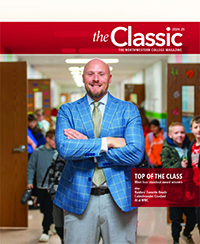Team finishes fourth in regional programming contest
Tuesday, November 18, 2008
A team of three Northwestern College students placed fourth among 201 squads in the North Central region of the Association for Computing Machinery International Collegiate Programming Contest on Nov. 15. The Northwestern team solved all nine problems and, based on time scores, finished behind teams from the University of Nebraska, Iowa State and the University of Wisconsin.
The Northwestern team—John Calsbeek, a junior computer science major from Orange City; Ben Kester, a senior actuarial science and computer science major from Urbandale, Iowa; and Curt Van Wyk, a senior mathematics teaching and computer science major from George, Iowa—placed first at the University of South Dakota site. There were 14 other sites in the region, which includes Iowa, Kansas, Manitoba, Minnesota, Nebraska, North Dakota, South Dakota, the Upper Peninsula of Michigan, western Ontario and Wisconsin.
“This was a fabulous performance,” says Michael Wallinga, instructor in computer science at Northwestern. “As far as I know, we’ve never before had all of the problems answered correctly at our local site. The team was smart in their approach, working on the easiest problems first. After they submitted incorrect answers for the last couple of problems, they were very thorough and methodical in exploring all the possibilities and discovering what they weren’t addressing.
“John, Ben and Curt are all phenomenal students. They put in a lot of time preparing for the contest and set their sights pretty high. For them to perform at this level is an amazing accomplishment,” says Wallinga.
The Northwestern team will find out by January whether their performance qualifies them for an at-large berth among 100 teams in the world finals next April in Stockholm, Sweden.
This marks the third straight year a Northwestern team has finished in the top 10 regionally. Calsbeek has been on each of those teams. Kester joined him on the 2006 team, and Van Wyk was a member of the 2007 team.
Northwestern had three other teams in this year’s competition, solving three, two and one problems, respectively. “It’s quite impressive for a department of our size to have this level of participation,” says Wallinga. “We’re proud of all of the students who participated.”
The competition challenges students to solve real-world problems using open technology and advanced computing methods under a grueling, five-hour deadline. Wallinga says students need to demonstrate creativity, teamwork, the ability to determine which problems are within their capability to solve, and the ability to work under time pressure.
Huddled around a single computer, teams of three students collaborate to deduce the requirements, design test beds and build software systems under the scrutiny of expert judges. The winning team is the one that solves the most problems in the fewest attempts within the least amount of time.
Over 6,000 college and university teams from 83 countries are participating in the competition, which is in its 33rd year and is sponsored by IBM.

